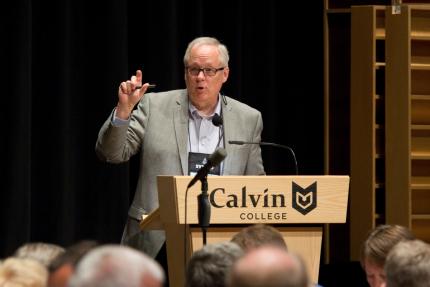Gallery of Numbers Reminds Synod That God is Good

Dr. Steven Timmermans, executive director, gives the State of the Church address
Karen Huttenga
Dr. Steven Timmermans, executive director of the Christian Reformed Church in North America, spoke to delegates at Synod 2018 about the state of the church. During his presentation, he specifically emphasized numbers and what data can tell us about the denomination and our future.
“Numbers themselves are not the goal, but they can help us understand ourselves better and can serve to remind us of what God calls us to do,” he said.
His talk was especially poignant as delegates will spend time this week discussing an overture that expresses concerns about the decline in membership of the CRCNA.
“The decades of trends in the overture coming from Classis Pacific Northwest are worthy to examine,” he said, “But this morning, I’d like to look at more recent trends based on the belief that our society is in a time of rapid change.”
The possibility to really shape our thinking and guide our learning, Timmermans said, lies with understanding the recent changes in our congregations and denomination as a whole.
To do this, Timmermans dug into some numbers recorded in the annual CRC yearbook. At the same time, he noted that these numbers are not perfect.
“Numbers received are only as good as the numbers provided,” he explained, pointing out that some congregations fail to respond to the annual yearbook survey. He also explained that sometimes we change how we count things, such as a decision this year to not count members of emerging churches since their membership is also counted by the organized church that is supporting them.
Another factor to consider, he pointed out, is the context within which membership numbers are reported. Demographics, for example, can play a factor.
“One number, such as total members, provides only one window into the church,” said Timmermans. He used some data provided by Neil Carlson at the Social Research Center at Calvin College to show how a large part of CRC membership decline in Canadian congregations can be explained by demographics. When you look at the change in numbers of “professing members” (usually 18 or older) compared to the decline in “total members”, which also includes children, CRCNA membership looks a lot more stable.
“Might it be the case that family size is shrinking?” he asked.
With those cautions about numbers explained, Timmermans went on to explore a few trends that he’s seen in the data.
First, he looked at the numbers of congregations that have opened or closed in recent years. In 2017, for example, the CRCNA closed 14 churches but planted 15 churches and welcomed 9 churches into “organized” status. The bulk of these were ethnic churches that were built around a specific immigrant community or language group.
“There is both greater evidence of planting of churches with an ethnic minority focus and the disbanding of such,” said Timmermans, who also noted that the U.S. is more prone to planting and closing congregations than Canada is.
“By and large, CRC congregations in the U.S. are further from immigration than in Canada. I’d suggest that the life of a congregation of any ethnic group gets more variable 3 or 4 generations in,” he said. “I suspect in the coming generation or two, we will see greater variability in Canadian congregations – more farewells and more welcomes.”
Timmermans also used data to explore regional patterns. He looked at professing members in every regional grouping of churches and noted which classes were the most stable or growing. The top classes were those, such as Red Mesa or Hanmi/Ko-am, that are organized around ethnicity. Other successful classes were those in growing urban and metropolitan areas.
“Metropolitan areas are becoming key gathering spots through immigration and a generation that wants to be close to the action of our cities, not removed from them,” said Timmermans.
In the end, he said that recent numbers show us that there are signs of hope and many things to celebrate.
“God is faithful, and there are many places where we’re bucking the trend even though society says faith is irrelevant and religious affiliation is passé. Praise God!,” he said.
He concluded by reminding delegates of the words of the Psalmist.
“Friends, God is at work in us and through us. Yes, we need to look at the data to spur us on to be ever more faithful, but don’t lose hope. Instead, rely on the petition of the psalmist in Psalm 25, ‘Show me your ways, Lord, teach me your paths. Guide me in your truth and teach me, for you are God my Savior, and my hope is in you all day long.’”
For continuous coverage of Synod 2018 including the live webcast, news, video recordings, photos, reports, liveblog, social media links, and more visit www.crcna.org/synod.


